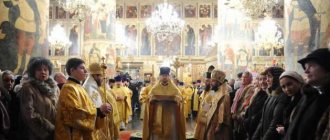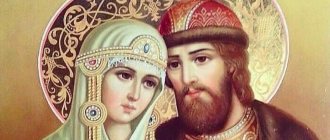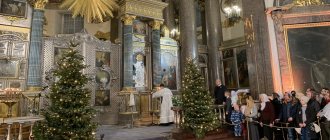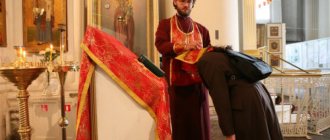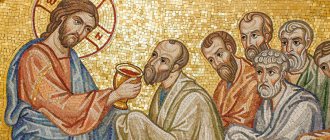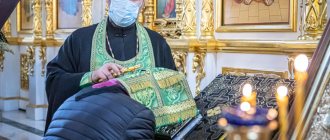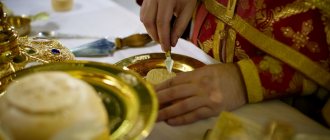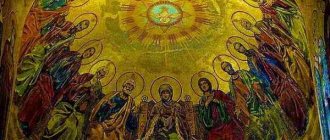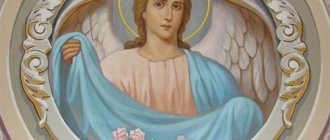History of appearance and significance in Orthodoxy
The emergence of the institution of announcement dates back to ancient times. Jesus Christ also bequeathed to his disciples-apostles to convey the basic doctrinal truths to those wishing to be baptized. But before being baptized, people had to undergo special training, which could last quite a long time. Therefore, such a concept as catechumen (catecheo) arose, translated from Latin meaning “to hear something from others.”
The catechumens studied the basics of faith, traditions, and rules. In addition, it took time to ensure the firmness of the decision made. Acquaintance with the Christian religion included a visit to the temple during a service. To allow catechumens to attend the service, a liturgy of catechumens was introduced, preceding communion.
The main purpose of the ritual is to prepare the believer for communion.
Each stage of this service has a symbolic meaning. In the first part of the service, words are heard announcing the birth of the Son of God. In the obligatory chants one can hear reminders of the redemptive feat of Christ. During the liturgy, the parishioners are explained the purpose of the Savior’s appearance on earth and the importance of the sacraments.
Saint John Chrysostom and his Liturgy
The Divine Liturgy of John Chrysostom is celebrated in all languages in which Orthodoxy is preached. And most often throughout the year, it is she who gathers us all together around the chalice with the Body and Blood of Christ. The Divine Liturgy is the most important service of the Church, it is the most important event for a person who has been baptized, and the guarantee of salvation.
(MP3 file. Duration 10:54 min. Size 10.5 Mb)
In the name of the Father and the Son and the Holy Spirit!
Today is a special joy for all of us: on this Sunday we not only celebrate the Resurrection of Christ, meet the risen Christ and glorify Him, and unite with Him, but we also remember the memory of the great saint of the Church of Christ, disciple and follower, teacher of the Church, great ascetic, theologian and the preacher - St. John Chrysostom.
This was a man who devoted his entire life without reserve, all the great gifts and talents that he received from the Creator, to the service of his Divine Teacher, our Lord Jesus Christ, for creation, for protection, for building His Church, for strengthening this divine body and its protection from heresies, schisms and false teachings.
In his youth, left without a father, with only one mother, he devoted himself to studying the highest knowledge of that time: his teachers were both philosophers and Christian ascetics. And when his mother departed to the Lord, he gave away all his property and retired to the desert for exploits, and for a long time lived there together with the same hermits, his friends and brothers in this work and this struggle, and labored in silence, in fasting and in prayer, avoiding in every possible way human glory and honor, and even the ministry that they already wanted to entrust to him and were preparing in the Church. But he could not avoid this service for a long time, and despite the fact that he had already accomplished many feats and written beautiful apologetic works, the Church called him to an even higher service, and he was elected bishop. And over time he became a bishop at the See of Constantinople. And there, with love, with heroism, with meekness, he instructed the people of God, the Church, built it up, established it.
This man left a great variety of creations; rarely any other ascetic can compare with him: he was both an apologist and an interpreter of the Holy Scriptures, he wrote teachings on various topics, which to this day, according to the Rule, must be read during services in church. Remember his beautiful “Word on the Resurrection of Christ,” which is urgently read all over the world on this holiday. There are a lot of such essays. But the most important, probably, of his work is that with which we all have direct communication and which serves us all for salvation - this is the Divine Liturgy of St. John Chrysostom.
He was not its creator in the literal sense, before him there were already ascetics who formed this order for years and centuries, but he acted as an editor - that is, he updated it, corrected it, knowing from his personal experience what was needed for the Church and for the weak , but a person seeking salvation. And since then, since the 4th century, this liturgy has been urgently served in almost all languages of the world. The Divine Liturgy of John Chrysostom is celebrated in all languages in which Orthodoxy is preached, and most often throughout the year it is this that brings us all together around the Chalice with the Body and Blood of Christ.
The Divine Liturgy is the most important service in the Church, this is the most important event for a person who has received Baptism and the guarantee of salvation in the sacrament of Baptism, this is the sacrament of communion with the Body and Blood of Christ, which takes place during the Divine Liturgy.
And with horror we see how many Christians still have not understood this and cannot understand it. And we ourselves are making too little effort to ensure that the whole world knows how important participation in the Divine Liturgy is for the salvation of the soul of every Christian. There is nothing higher, there is nothing stronger, there is nothing more important on this day than to gather and meet with our Lord Jesus Christ and unite with Him inseparably, to merge with Him both in prayer and in the communion of the Holy Mysteries of Christ.
John Chrysostom spoke especially about Communion. He said that a person, receiving communion, uniting with Christ in Communion, is a body, and this body acquires a Head. That is, a person who does not partake of the Body and Blood of Christ cannot be a full-fledged person and Christian; he is like a body without a head. We are all the body of Christ, and our Head is Christ, uniting with His Divine Blood, with which He washed away our sins and redeemed this world - the Lord gives this Blood to us today, returns it, so that we merge completely with Him. When a person loves something in this world, or some person, or some phenomenon, he seems to merge with it, he strives to become one body with it. Likewise, Christians are called to strive to strive to unite with Christ in the sacrament of Communion of the Body and Blood of Christ. This, on the one hand, is so simple, but on the other hand, incomprehensible, and this requires humility, love, and meekness, and obedience to the Church of Christ, similar to that which the divine teacher showed all his life, whose golden lips preached truth and salvation.
The saint says that from the altar during the liturgy, as from paradise, rivers of Divine Truth flow, and angels gather around this source, flocking together, just as deer gather near a source of life-giving water in the desert. This is how angels, archangels, saints gather, and we gather with them near this source to be nourished by the Divine Truth, to strengthen ourselves, so that our soul, exhausted, dried up in the desert of sin, burned by the arrows of the devil, is saturated with this Divine water - the Blood of Christ, the Body Him, and lived, and was alive in Eternal Life, and was inseparable from Christ and with all the saints. John Chrysostom gives such an image to Christians, whom the Lord allows with their lips to touch His Body.
He says, addressing Christians who receive communion: having partaken of the Body and Blood of Christ, you become like lions, whom the devil fears, and his servants scatter in horror and fear. This is what strength and what invincible grace has been given to all of us, Christians, and how much strength, how much energy, how many deeds John Chrysostom suffered in order to convey this truth to us, deaf, resisting, timid, cowardly, but still seeking salvation. Communicating the Body and Blood of Christ, we will give praise to our Savior Lord Jesus Christ, the Creator of heaven and earth, and the great ascetics, and St. John Chrysostom, through whose prayers the Lord will have mercy and save us, for he is good and a lover of mankind. Amen.
How does follow up work?
The Liturgy of the Catechumens is part of the general worship service. It follows the preparatory part - proskomedia. Then the deacon, standing on the pulpit, announces the beginning of the service. The glorification of the Holy Trinity by the priest begins, accompanied by the singing of psalms by the choristers. The rite of the Liturgy of the Catechumens includes the following stages:
- The Great Litany, in which they ask the Lord for peace for everyone, help for those traveling, the sick, and those in captivity. In joint prayer they turn to the Lord asking for mercy for the Church, the Patriarch, the country, rulers, and soldiers.
- Antiphons are chants sung alternately by two choirs. There are three types of antiphons: daily, Sunday (figurative) and holiday. Consist of psalms containing glorifying texts.
- The Small Entrance is a procession symbolizing the appearance of Jesus Christ to preach. The procession is preceded by the presentation of the Gospel to the deacon by the priest. The Holy Book is taken out through the northern gate and brought in through the Royal Gate. The procession ends with the singing of the Trisagion.
- Reading the Apostle and the Gospel. Before the reading begins, the deacon, going out to the pulpit, raises the Holy Book, calling on the believers to prepare to hear the Gospel. During the reading, the priest is behind the throne, facing the people. Believers listen standing, heads bowed.
- A special (strengthened) litany, differing from the Great Litany by additional prayers. They mention the names of those who applied for the liturgy. The priest, together with all the people, asks the Lord to grant health and salvation to all the servants of God who are remembered in prayers.
- Litany for the Dead, during which they pray for deceased relatives and friends, asking the Lord to forgive them their voluntary and involuntary sins, placing them in the heavenly abode next to all the righteous.
- Litany of the Catechumens, where the deacon invites the catechumens to pray for themselves. Then he asks the believers to pray for the catechumens, asking the Lord to have mercy on them, guiding them on the true path.
The Liturgy of the Catechumens ends with the words “Catechumens, go forth.” After these words, those who have not been baptized must leave the church, as the Liturgy of the Faithful begins.
DIVINE LITURGY
LITURGY OF THE FAITHFUL
This is the name of the third part of the Liturgy because only the faithful can attend it,
that is, baptized. It can be divided into the following parts: 1) transferring honest Gifts from the altar to the throne; 2) preparing believers for the consecration of the Gifts; 3) consecration (transubstantiation) of the Gifts; 4) preparing believers for communion; 5) communion and 6) thanksgiving for communion and dismissal.
TRANSFER OF HONEST GIFTS FROM THE ALTAR TO THE THRONE
After inviting the catechumens to leave the temple, two short litanies are pronounced and the Cherubic hymn is sung: “Even though the Cherubim secretly form, and the Life-Giving Trinity sings the thrice-holy hymn, let us now put aside all worldly cares. As if we will raise up the King of all, the angels invisibly bring us to the chinmi. Alleluia
(three times)
".
In Russian, this song reads like this: “We, mysteriously depicting the Cherubim and singing the thrice-holy hymn to the Trinity, which gives life, will now leave concern for everything everyday, so that we can glorify the King of all, Whom the invisibly angelic ranks solemnly glorify. Praise be to God! Individual words of the Cherubic song mean: secretly forming
- mysteriously portraying or mysteriously presenting oneself;
life-giving
- life-giving;
chanting
- chanting;
put it aside
- leave it;
worldly care
- care for everyday things;
like yes
- so that;
let's raise
- raise, glorify;
dorinoshima
- solemnly worn, glorified (
"dori"
is a Greek word and means spear, so
"dorinoshima"
means spear-carrying; in ancient times, wanting to solemnly glorify chests or military leaders, they put them on shields and, raising them up, carried them on these shields in front of troops, and the shields were supported by spears, so that from a distance it seemed that the glorified persons were being carried on spears);
angelic chinmi
- angelic ranks;
Alleluia
- praise to God.
The Cherubim Song reminds believers to now abandon all thoughts about everyday things, imagining that they, like the Cherubim, are near God, in heaven, and as if together with them they are singing the thrice-holy song to Him - praise to God. The royal gates open before the Cherubic Song
and the deacon commits
incense,
and the priest, in secret prayer, asks the Lord to cleanse his soul and heart from the evil conscience and, by the power of the Holy Spirit, to deign him to bring the prepared Gifts to God;
then the priest and deacon in an undertone recite the Cherubic hymn three times, and both go to the altar to transfer the venerable Gifts from the altar to the throne.
The deacon, having “air” (a large covering) on his left shoulder, carries a paten on his head, and the priest holds a holy cup in his hands.
Coming out of the altar by the northern doors (the singing of the Cherubic song at this time is interrupted by the words “let us put aside care”
), they stop at the pulpit and, turning their faces to the believers, pray for His Holiness the Patriarch, for the ruling bishop, metropolitans, archbishops, bishops, for the priesthood, monasticism, for the creators of the temple, for the Orthodox Christians present, and return through the royal doors to the altar;
honest Gifts are delivered to the throne on an unfolded antimension and covered with “air”, after which the royal doors are closed and covered with a curtain; Meanwhile, the singers finish the Cherubic Hymn. The transfer of the Gifts from the altar to the throne is called the great entrance
and marks the solemn procession of Jesus Christ to free suffering and death on the cross.
Believers at this time should stand with their heads bowed and pray to the Lord to remember them and all those close to them in His Kingdom; when the priest says, “May the Lord God remember you and all Orthodox Christians...”
you must say in a low voice:
“And may the Lord God remember your priesthood in His Kingdom always, now and ever, and unto ages of ages.”
PREPARING BELIEVERS FOR THE SANCTIFICATION OF HONEST GIFTS
After the great entrance comes the preparation of the faithful for a worthy presence at the consecration of the prepared Gifts. It begins with the petitionary litany
“Let us fulfill our prayer to the Lord”
for
the “honest gifts offered
,” so that they would be pleasing to the Lord, for which the priest secretly prays at the same time, and so that the Lord would sanctify them with His grace.
Next, we ask the Lord for help to spend the whole day ( “the day of everything”
) in perfection, that is, holy, peaceful and without sin;
send us a Guardian Angel, faithfully guiding us on the path of truth and goodness and protecting our souls and bodies from all evil; We ask you to forgive ( "forgiveness"
) and forget (
"forgiveness"
) our occasional sins and frequently repeated transgressions;
to give us everything that is good and useful for the soul (and not what pleases our destructive passions and what we often desire); and so that people ( “peace”
) live and work in peace among themselves (and not in hostility and mutually destructive struggle);
and so that we spend the rest of our lives ( “the rest of our lives”
) in peace with our neighbors and with our conscience and, in contrition (
“repentance”
) for the sins we have committed;
were honored with Christian death, that is, by confessing and partaking of the Holy Mysteries of Christ. We ask for a painless, non-shameful death, since there are cases of death that are shameful for a Christian, for example, from drunkenness, suicide, fighting, etc. We ask for a peaceful death, that is, in spiritual peace and reconciliation with neighbors. And so that the Lord will deign us to give a kind, fearless answer at His Last Judgment. For a worthy presence during the celebration of the sacrament, the following are necessary: peace of mind, mutual love and the true (Orthodox) faith that unites everyone. Therefore, after the litany of petition, the priest, blessing the people, says: “Peace to all!”
Those praying immediately express the same wish to his soul (
“and to your spirit”
).
Then it is proclaimed: “Let us love one another, that we may confess with one mind,”
to which the singers sing:
“Father and Son and Holy Spirit, Trinity of One Essence and Indivisible.”
This shows who should be so unanimously confessed (recognized).
Following the next cry of “Doors, doors!
Let us sing of wisdom!” the Symbol of Faith is sung (or read), which briefly, but exhaustively accurately, sets out our faith in the Holy Trinity and other main truths of the Orthodox Church.
At the same time, the curtain on the royal doors is pulled back and the “air” is removed from the honest Gifts. The words “Doors, doors!”
in ancient times they reminded the doorkeepers to better watch the doors of the temple and not allow catechumens and nonbelievers into it;
Now, with these words, believers are reminded to close the doors of their souls to extraneous thoughts, and with the words “Let us listen to wisdom,”
it is indicated that we should be attentive to the wise truths of the Orthodox faith, set forth in the Creed.
From this moment on, believers should not leave the church until the end of the Liturgy.
How reprehensible it is to violate this requirement can be seen from the 9th Apostolic Canon:
“All the faithful who enter the church... and do not remain in prayer
to the end, as causing disorder in the church, should be excommunicated from church communion.”
After the Creed, the exclamation “Let us stand
(let us stand)
kindly, let us stand with fear, let us take in the holy offering in the world,”
draws the attention of believers to the fact that the time has come to bring the “holy offering” or sacrifice, that is, to perform the holy sacrament of the Eucharist, and with This moment must be stood with special reverence.
In response to this exclamation, we sing: “Mercy of peace, sacrifice of praise
,” that is, let us offer with gratitude for the mercy of the heavenly world given to us from above the only sacrifice of praise available to us.
The priest blesses the believers with the words: “The grace of our Lord Jesus Christ and the love
(love)
of God and the Father and the communion
(communion)
of the Holy Spirit be with you all
,” and, calling for reverent stand, proclaims:
“woe we have our hearts,”
that is, we will have hearts directed upward - towards God.
To this, the singers reverently answer on behalf of the worshipers: “Imams to the Lord
,” that is, we already have hearts directed toward the Lord.
SANCTIFICATION (TRANSESSION) OF GIFTS
The celebration of the holy sacrament of Communion constitutes the most important part of the Liturgy. It begins with the words of the priest, “We thank the Lord!”
Believers express their gratitude to the Lord for all His mercies by worshiping Him, and the singers sing:
“It is worthy and righteous to worship the Father and the Son and the Holy Spirit, the Trinity, Consubstantial and Indivisible.”
At this time, the priest, in a secret prayer called
Eucharistic
(thanksgiving), glorifies the endless perfections of God, thanks the Lord for the creation and redemption of man and for all His mercies, known and unknown to us, and for the fact that He deigns to accept this bloodless Sacrifice from us , although higher beings stand before Him - Archangels, Angels, Cherubim and Seraphim,
“singing a victory song, crying out, calling out and speaking.”
The priest pronounces the last words aloud, and the singers fill in, singing the song that the Angels cry:
“Holy, Holy, Holy is the Lord of Hosts
(Lord of the Powers of Heaven),
fill
(fill)
the heavens and the earth with Your glory
.
To this song, called the Seraphim
, the singers add exclamations with which the people greeted the Lord’s entry into Jerusalem:
“Hosanna
(Jewish goodwill: save, help God!)
in the highest!
(in heaven)
blessed is he
who
comes (to the glory)
of the Lord, hosanna in the highest!”
The words
“singing a song of victory...”
are taken from the visions of the prophet Ezekiel (Ezekiel 1:4-24) and the Apostle John the Theologian (Rev. 4:6-8);
In revelation they saw the throne of God, surrounded by Angels in the form of an eagle (singing), a calf (crying), a lion (crying) and a man (speaking), who continually exclaimed:
. ”
The priest secretly continues the Eucharistic prayer, glorifying the blessings of God, the infinite love of God revealed in the coming to earth of the Son of God, and, remembering the Last Supper, when the Lord established the sacrament of communion, he pronounces aloud the words of the Savior: “Take, eat, this
(this)
is My Body,
(which)
is broken
for you
(for you) (forgiveness)
of sins”
and
“Drink of it, all of you, this
(this)
is My Blood of the New Testament, which
(which)
is for you and for much is poured out for the remission of sins
.
After this, the priest, in secret prayer, briefly recalls the Savior’s commandment to perform communion, glorifies His suffering, death, resurrection, ascension and His second coming, and says aloud: “Thine from Thine is offered to Thee for all and for all”
(about all members of the Church and all blessings of God).
The singers sing drawn outly: “We sing to You, we bless You, we thank You, Lord; and pray, our God"
, and the priest in secret prayer asks the Lord to send the Holy Spirit on the upcoming people and on the offered Gifts, so that He would sanctify them.
Then in a low voice he reads the troparion for 3 hours: “Lord, Who sent down Thy Most Holy Spirit in the third hour by Thy Apostle, do not take Him away from us, O Good One, but renew us who pray
.
The deacon pronounces the twelfth verse of Psalm 50: “Create a pure heart in me, O God, and renew a right spirit in my womb
.
The priest again reads the troparion for 3 hours, the deacon pronounces the thirteenth verse of Psalm 50: “Do not cast me away from Your presence and do not take Your Holy Spirit from me
.
The priest reads the troparion for the third time for 3 hours. Blessing the Holy Lamb (on the paten), he says: “And create this bread - the honorable Body of Your Christ
.
Blessing the wine (in the Holy Chalice), he says: “And in this cup is the precious Blood of Thy Christ
.
The deacon says at each exclamation: “Amen
.
Finally, blessing the bread and wine together, the priest says: “By Thy Holy Spirit
.
The deacon says three times: “Amen, amen, amen
.
In these great and holy moments, bread and wine are transformed into the true Body and true Blood of Christ.
The priest makes a prostration before the Holy Gifts as to the King and God Himself.
This is the most important moment of the Liturgy.
After the consecration of the Holy Gifts, the priest in secret prayer asks the Lord that the Holy Gifts may be given to those who receive communion “for the sobriety of the soul.”
(i.e., strengthening in every good deed),
for the remission of sins, for the communion of the Holy Spirit, for the fulfillment
(reception)
of the Kingdom of Heaven, for boldness towards You
(i.e., to be given the right to turn to the Lord with all needs) ,
not to judgment or condemnation
,” and remembers those for whom this Sacrifice was made: Holy Gifts are offered to the Lord God, as a thanksgiving Sacrifice for all the saints.
In particular ( “fairly”
) the priest remembers the Blessed Virgin Mary, and therefore loudly pronounces:
“Fairly about the Most Holy, Most Pure, Most Blessed, Glorious Our Lady Theotokos and Ever-Virgin Mary
,” to which the believers respond with a song of praise in honor of the Mother of God:
“Worthy there is...”
(On Holy Easter and on all the twelve feasts (before they are celebrated), instead of “It is worthy to eat,” the
zadostoynik
, i.e., the 9th irmos of the festive canon with the corresponding chorus).
The priest, meanwhile, secretly prays for the dead and, moving on to prayer for the living, aloud: “First remember, Lord, the Great Master...”
, remembering the highest church hierarchy.
Believers answer: “And everyone and everything
,” that is, remember, Lord, all believers.
The prayer for the living ends with the exclamation of the priest “And grant us with one mouth and one heart
(with one accord)
to glorify and glorify Thy most honorable
(glorious)
and magnificent
(majestic)
name, of the Father and the Son and the Holy Spirit, now and ever and unto the ages of ages”
and His blessing, taught to all those present in the temple:
“And may the mercies of the Great God and our Savior Jesus Christ be with you all
.
Next comes the next part of the Liturgy of the Faithful.
PREPARING BELIEVERS FOR COMMUNION
It begins with a petitionary litany:
“Having remembered all the saints, let us pray again and again in peace to the Lord,”
that is, having remembered all the saints, again and again let us pray to the Lord
“for the offered and consecrated honorable Gifts
,” so that (
yes
) our Lover of Mankind, having accepted them (
receiving me
) into His holy, heavenly and spiritual (
mental
) altar as a spiritual fragrance, as a sacrifice pleasing to Him (
into the stench of a spiritual fragrance
), sent down to us Divine grace and the gift of the Holy Spirit.
This is followed by the usual petitions of the litany of petition, which ends with the exclamation of the priest : “And grant
(honor)
us, Master, with boldness
(boldly, like children ask their father),
without
condemnation dare (dare
) to call on You, Heavenly God the Father, and speak
.
The Lord's Prayer “Our Father” is sung. The abbots do well when all those present are invited to sing this prayer. This is followed by the teaching of peace and the veneration of the heads, during which the priest prays to the Lord to sanctify the believers and grant them the opportunity to partake of the Holy Mysteries without condemnation. At this time, the deacon, standing on the pulpit, girds himself with an orarion in a cross shape in order, firstly, to freely serve the priest during communion, and secondly, to express his reverence for the Holy Gifts in imitation of the Seraphim, who, surrounding the throne of God, covered their faces with wings (Isa. 6:2-3). At the deacon’s cry of “Let’s get out!”
the curtain is drawn, and the priest, raising the Holy Lamb over the paten, loudly proclaims:
“Holy to the holy
.
This means: The Holy Gifts can only be given to “saints,” that is, believers who have sanctified themselves through prayer, fasting, and the sacrament of repentance
(confession).
Realizing their unworthiness, the singers on behalf of the believers proclaim: “One is Holy, One is Lord, Jesus Christ, to the glory of God the Father.
Amen .
COMMUNION
The clergy are the first to receive communion at the altar. The priest breaks the Holy Lamb into four parts, receives communion himself and teaches the Holy Mysteries to the deacon. The portions for the communion of the laity after the communion of the clergy are lowered into the chalice. During the communion of the clergy, a verse called “sacramental”
, and then some chant is sung or prayers are read before communion.
The royal doors open
for the communion of the lay faithful, and the deacon, holding the holy cup in his hands, says:
“Come with the fear of God and faith
.
The opening of the royal doors at this time resembles the opening of the Savior’s tomb, and the removal of the Holy Gifts resembles the appearance of Jesus Christ after the resurrection. Bowing before the holy cup, as before the risen Savior Himself, the singers sing on behalf of the believers: “Blessed is he who comes in the name of the Lord;
God is the Lord and appeared (appeared)
.
” The communicant laity, “with the fear of God and faith,”
approaching the holy chalice with a preliminary bow, repeat in a low voice the prayer pronounced by the priest before communion,
“I believe, Lord, and confess...”
, in which they confess their faith in Jesus Christ as the Son of God, the Savior of sinners , faith in the Sacrament of Communion, in which, under the guise of bread and wine, they receive the true Body and true Blood of Christ, as a guarantee of eternal life and mysterious communion with Him;
and they ask Him to deign them to uncondemnably partake of the Holy Mysteries for the remission of sins, promising not only not to betray Christ, not to be a traitor Judas, but also in the midst of life’s suffering, like a prudent thief, to firmly and boldly confess their faith. Having bowed to the ground, believers rise to the pulpit to receive the Holy Mysteries. Before this time, for the sake of order and reverence for the shrine, you should not leave your place; and it is completely unacceptable to embarrass others and desire to be among the first to receive communion; everyone must remember that he first is only a sinner.
With their hands folded crosswise on their chests, those receiving communion approach the royal doors, without making the sign of the cross in front of the holy cup, which they kiss after communion, also without crossing themselves, so as not to push the holy cup.
According to the faith of parents and educators and according to the words of the Savior “Do not hinder the children from coming to Me”
and
“drink of it, all of you,”
at the same time children also receive communion (without confession until the age of seven).
After communion, believers take lukewarm wine, that is, church wine mixed with water, so that not even the slightest particle of the Holy Gifts remains in the mouth. After the communion of the laity, the priest lowers into the holy chalice all the particles that were taken out of the service and brought prosphoras, with a prayer that the Lord, with His Blood and the prayers of the saints, will cleanse the sins of all for whom the particles were taken out. He then blesses the believers with the words “Save, O God, Thy people
(those who believe in You)
and bless Your property”
(Your property, the Church of Christ).
In response to this they sing: “We have seen the true light, we have received the Heavenly Spirit, we have acquired the true faith;
We worship the Inseparable Trinity: She saved us .
The content of this song: we have seen the true light, because, having washed away our sins in the sacrament of baptism, we are now called sons of God by grace (mercy), sons of light, we have received the Holy Spirit through holy confirmation, we profess the true (Orthodox) faith, we worship the Indivisible Trinity, because She saved us ( "She saved us"
).
The deacon, taking the paten from the hands of the priest, carries it to the altar, and the priest, taking the holy cup and blessing those praying with it, proclaims “Always, now and ever, and unto ages of ages
,” and takes it to the altar.
This last manifestation of the Holy Gifts to believers, their transference to the altar and the exclamation of the priest remind us of the ascension of the Lord Jesus Christ into heaven and His promise to abide in the Church “always, even to the end of the age”
(Matthew 28:20).
THANKSGIVING FOR COMMUNION AND DISMISSION
Worshiping the Holy Gifts for the last time as the Lord Jesus Christ Himself, believers thank the Lord for receiving the Holy Mysteries. The singers sing a hymn of gratitude: “May our lips be filled with Thy praise, O Lord, for we sing Thy glory, for Thou hast made us worthy to partake of Thy Holy, Divine, Immortal and Life-giving Mysteries; keep us in Thy sanctuary all day long, so that we may learn Thy righteousness. Alleluia, alleluia, alleluia"
.
That is, praising the Lord for the fact that He deigns us to partake of the Divine, Immortal and Life-giving Mysteries, we ask Him to preserve us in the holiness received in the sacrament of communion, to learn the truth of God all day long. After this, the deacon pronounces a short litany “Forgive me, having received the Divine... Mysteries of Christ...”
(having received communion with reverence), calling for
“worthily thanking the Lord
.
Having asked for His help to spend this day holy, peacefully, sinlessly, he invites you to surrender yourself and your life to Christ God. The priest, having folded the antimension and placing the Gospel on it, proclaims: “For Thou art our sanctification, and to Thee we ascribe glory to the Father, and to the Son, and to the Holy Spirit, now and ever, and unto ages of ages,”
and adds:
,
” showing that the Liturgy is ending and that one must leave the church peacefully, in peace with everyone. The singers sing on behalf of everyone: “In the name of the Lord
,” that is, we will leave with the blessing of the Lord.
The priest comes out to those praying behind the pulpit and reads the prayer behind the pulpit
, in which he once again asks the Lord to save His people and bless His property, to sanctify those who love the splendor (beauty) of the temple, not to abandon with His graces all those who trust (hope) in Him, to give peace to the world (the universe ), priests, faithful rulers and all people.
This prayer is an abbreviation of all the litanies pronounced during the Divine Liturgy. At the end of the prayer behind the pulpit, believers surrender themselves to the will of God with the prayer of the righteous Job: “Blessed be the name of the Lord from now on and forever
.
Most often, it is at this time that a pastoral sermon is preached for spiritual enlightenment and edification,
based on the Word of God.
Then the priest, blessing the believers for the last time, says: “The blessing of the Lord is upon you, through His grace and love for mankind, always, now and ever, and unto ages of ages,”
and gives thanks to God:
“Glory to Thee, Christ our God, our hope, glory to Thee !
Turning to the people and having the altar cross in his hand, making the sign of the cross, which all those present must do, the priest pronounces
the dismissal: “Christ, our true God...”
On dismissal, the priest, remembering the prayers for us of the Mother of God, the apostles, the temple saint, the saints whose memory we celebrate on this day, the righteous Godfather Joachim and Anna (parents of the Mother of God) and all the saints, expresses the hope that Christ, our true God, will have mercy and save us, as He is Good and Lover of Mankind;
He immediately gives the cross to the believers to kiss. Every Christian believer, without haste and without embarrassing others, in a certain order, must kiss the cross in order to testify with the kiss of the cross his fidelity to the Savior, in whose memory the Divine Liturgy was performed. At this time, the choir sings a prayer for the preservation of for many years
.
| TABLE OF CONTENTS |
Antiphons are figurative
Antiphon 1 (Psalm 102), sung on the 1st troparary tone:
1. Bless the Lord, my soul./ Blessed are you, the Lord./ Bless the Lord, my soul,/ and all that is within me/ His Holy Name. 2. Bless the Lord, my soul, / and do not forget all His rewards. 1. Who cleanses all your iniquities, / heals all your illnesses. 2. He who delivers your life from corruption, / who crowns you with mercy and bounty. 1. He who fulfills your good desires:/ your youth will be renewed like an eagle. 2. The Lord creates alms, / and the fate of all those who are offended. 1. He told Moses His ways, / His desires to the sons of Israel. 2. The Lord is generous and merciful, / long-suffering and abounding in mercy. 1. He is not completely angry, / he is at enmity for centuries. 2. It was not because of our iniquity that he made us eat, but because of our sins he rewarded us to eat. 1. As the height of the heavens is from the earth, / the Lord established His mercy on those who fear Him. 2. As far as the east is from the west, / he has removed our iniquity from us. 1. As a father gives generously to his sons, / the Lord rewards those who fear Him. 2. For He knows our creation, / I will remember him as the dust of Him. 1. Man is like the grass of his days, / like the flower of the field, so he will bloom. 2. For a spirit passed through him, and was not, / and no man knew his place. 1. The mercy of the Lord is from everlasting and everlasting on those who fear Him. 2. And His righteousness is upon the sons of the sons, who keep His covenant, / and remember His commandments / to do. 1. The Lord has prepared His Throne in heaven, / and His Kingdom possesses all. 2. Bless the Lord, all His angels, / who are mighty in strength, who do His word, / to hear the voice of His words. 1. Bless the Lord, all His might, / His servants who do His will. 2. Bless the Lord, all His works, / in every place of His dominion. 1. Glory to the Father and the Son and the Holy Spirit. / And now and ever and unto ages of ages. Amen. 2. Bless the Lord, my soul, / and all that is within me, / His holy name. / Blessed are you, O Lord.
(download)
Psalm 102 in Russian.
1. Bless the Lord, my soul. / Blessed are You, Lord! / Bless the Lord, my soul, / and all that is within me is His holy name. 2. Bless the Lord, my soul, / and do not forget all His benefits. 1. He forgives all your iniquities, / heals all your illnesses. 2. He delivers your life from destruction, / crowns you with mercy and bounty. 1. Fulfills your desire with good things, / your youth will be renewed like an eagle’s. 2. The Lord shows mercy / and judgment to all those who are offended. 1. He made known His ways to Moses, / His desires to the children of Israel. 2. The Lord is generous and merciful, / long-suffering and abounding in mercy. 1. He is not completely angry / and is not forever indignant. 2. He did not deal with us according to our iniquities, / and did not repay us according to our sins. 1. For, according to the height of the heavens from the earth, / the Lord established His mercy towards those who fear Him. 2. How far is the east from the west, / He removed our iniquities from us. 1. As a father has mercy on his sons, / the Lord has mercy on those who fear Him. 2. For He knows our composition, / remembers that we are dust. 1. Man is like the grass of his days, / like the flower of the field, so he will bloom. 2. For the breath has ceased in him - and he will not be, / and he will no longer recognize his place. 1. The mercy of the Lord is from everlasting to everlasting/ on those who fear Him. 2. And His righteousness is upon the sons of sons, who keep His covenant / and remember His commandments to do them. 1. The Lord has prepared His throne in heaven, / and His kingdom rules over all. 2. Bless the Lord, all His angels, / mighty in might, who do His word, / as soon as they hear the voice of His words. 1. Bless the Lord, all His armies, / His servants who do His will. 2. Bless the Lord, all His creatures, / in every place of His dominion. 1. Glory to the Father, and the Son, and the Holy Spirit, now, and always, and unto ages of ages. Amen. 2. Bless, my soul, the Lord / and all that is within me / - His holy name. / Blessed are You, Lord!
Antiphon 2 (psalm 145):
1. Praise, my soul, the Lord. / I will praise the Lord in my belly, / I will sing to my God, even as I am. 2. Do not trust in princes, in the sons of men, / in them there is salvation. 1. His spirit will depart and return to his land:/ on that day all his thoughts will perish. 2. Blessed is the God of Jacob, whose trust is in the Lord his God. 1. He created the heavens and the earth, / the sea and everything that is in them. 2. Keeping the truth forever, / bringing judgment to the wronged, / giving food to the hungry. 1. The Lord makes the bound, / The Lord makes wise the blind. The Lord raises up the downtrodden, / The Lord loves the righteous. 2. The Lord protects strangers, / he will accept the orphan and the widow, / and he will destroy the way of sinners. 1. The Lord will reign forever, / Your God, O Zion, forever and ever.
(download)
Psalm 145 in Russian.
1. Praise the Lord, my soul. / I will praise the Lord all my life, / sing to my God as long as I exist. 2. Do not trust in princes, in the sons of men, / in whom there is no salvation. 1. His spirit will depart, / and he will return to his land, / on that day all his thoughts will perish. 2. Blessed is he who has the God of Jacob as his helper, / his hope is in the Lord his God. 1. Who created the heavens and the earth, / the sea and everything that is in them. 2. Keeping the truth forever, / bringing justice to the oppressed, / giving food to the hungry. 1. The Lord sets free the prisoners, / The Lord makes the blind wise. / The Lord raises up the downtrodden, / The Lord loves the righteous. 2. The Lord protects strangers, / He will accept the orphan and the widow, / and the path of sinners will turn into nothing. 1. The Lord will reign forever, / Your God, O Zion, to generation and generation.
Antiphon 3rd (“Blessed”):
1. In Your Kingdom, remember us, O Lord, when You come, in Your Kingdom. On 12: 1. Blessed are the poor in spirit, for of them is the Kingdom of Heaven. 2. Blessed are the mourners, for they will be comforted. On 10: 1. Blessed are the Crocs, for they will inherit the earth. 2. Blessed are those who hunger and thirst for righteousness, for they will be satisfied. On 8: 1. Blessed are the mercy, for you will receive mercy. 2. Blessed are those who are pure in heart, for they will see God. On 6: 1. Blessed are the peacemakers, for these shall be called the sons of God. 2. Blessed Ones drive out the truth for the sake of them, for the Kingdom of Heaven is theirs. On 4: 1. Blessed are they, when they revile you, and spoil you, and say every evil word against you, who lie for My sake. 2. Rejoice and be glad, for your reward is abundant in Heaven. 1. Glory to the Father and the Son and the Holy Spirit. 2. And now and ever and unto ages of ages. Amen.
(download)
Gntifn first (P. Rв):
No. Bless the soul of the soul, / bless the 3si2 gdi. at 7. Bless2 souls of the city, / and3 do not forget all rewards є3гw2: №. The one that cleanses all your wickedness,/ and heals all your ailments: v7. And #saving t and3 stlenіz your life,/ crowning ts with mercy and3 generosity: No. And your wish will come true:/ Renew your creativity. at 7. The creative mercy of God,/ and the 3 fates of all who are killed. No. The tale of the path6 is ‰ mwmseovy,/ sonsHm ї}left thoughBnіz ‰. at 7. Generous and 3 merciful, / long-suffering and 3 merciful. No. He is not completely angry, / he is at enmity forever. at 7. It was not because of our iniquities that He created us, / but because of our sins He rewarded us. No. Ћкw in height nbcney t of the earth2,/ ўconfirmed1lъ є4st gDь mlct2 on bosshikhсz є3гw2. at 7. E#li1kw tstost easterns t z†padd,/ ўdalil є4st t us without lawlessness n†sha. No. “The skin is generous with dreams, / “generous with those who are born” є3гw2. at 7. This is our creation,/ remember, ћkw finger є3cm2: No. Man, the grass of the day is 3gw2, / the color of the countryside is like that. at 7. The spirit will pass through it, / and3 it will not be, / and3 no one will know his place. No. Mlct gDнz t centuries and3 to a century/ on bosshchikhsz є3гw2, в7. And # the truth є3гw2 on the sons of the sonsHv/ keeping the covenants є3гw2,/ and the 3 most important commandments є3гw2/ create |. No. GD on nb7si2 ўgo0va prt0l sv0y,/ and 3 tsrtvo є3гw2 њpossesses everything. at 7. Bless all the cities of є3гw2,/ the strong strength, the creative words of є3гw2,/ listen to the voice of the words є3гw2. No. Bless all the forces є3гw2,/ servants є3гw2, creative in 0ly є3гw2. at 7. Bless all the deeds є3гw2,/ in every place of greatness є3гw2. No. Slava nts7Y, i3 sn7u, i3 s™0mu d¦u, v7. And# nhne and3 at1snw, and3 forever and ever. ґмi1н. No. Bless2 the soul of the moS gDa, / and3 all‰ internal nzz mo‰, and4mz with™0e є3гw2./ Blless є3с2 gDi.
GntifHn second (P. rm7є):
No. Praise the 2 souls of my soul. / I will praise the 2 years in my belly, / I sing to my soul, until I reach 4 cm. at 7. Do not rely on princes, on human dreams, / in any case there is no salvation. No. And the spirit є3гw2 will come,/ and 3 return1tsz to its land2:/ on that day everyone who thought 1ніz є3гw2 will perish. at 7. Blzhen, є3мыже bG їакввл assistant є3гw2,/ ўпованіе є3гw2 on gDa bGa his2: No. Sotv0rshago nb7o i3 earth,/ m0re, i3 all‰ ±zhe v ni1kh: v7. Preserving the truth forever,/ creating justice for the slain,/ giving food to the hungry. No. Where decides њkov†nnyz, / where wise blind people2, v7. Where the downtrodden will be raised up, / where the righteous will love. No. Where the aliens will keep,/ si1ra and 3 widows will come,/ and 3 will destroy the sinners. at 7. VotsRi1tsz gD in the century, / bG in the s_Hne, in the r0d and 3 r0d.
Gentifn third, closest:
No. In your honor, remember2 us wherever you come. On v7i: No. Blzheny poor houses, ћкw those є4 there is a valuable thing. at 7. Blzheni crying ћкw tji ўtyoshatsz. On ‹: No. Blzheni kr0tsyi, ћkw tji inherit the earth. at 7. Those who are hungry and thirsty for truth, like us. On }: No. Blessed are merciful, and there will be pardons. at 7. Bless your heart with purity, let's see. On S7: No. Blzheny peacemakers, ћкw tji again b9іi will call. at 7. For the sake of truth, please and expel it, because this is the whole thing. On d7: No. Blzheni є3st, є3гдA pon0szt you, and3 and3zhenyt, and3 rekyt vssk ѕ0лъ verb0лъ, for your2 falsely for meє2 sake. at 7. Rejoice and 3 cheer1tesz, ћkw bribe your many on nb7syokh. No. Glory to nts7Y and3 sn7u and3 s™0mu d¦u. at 7. And # nhne and3 pri1snw and3 forever vekHv, ґmi1n.
Author: Administrator
Date of publication: 01/15/2019
Responses (426)
You must be logged in to leave a response.
